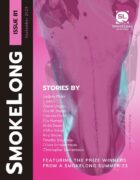I notice the under- and overcurrents of caring for and being cared for. Bearing and holding. Loss. Weight. What is the significance to you of salt in the first line, and the way the line ends with “now”?
salt’s strange. it exists naturally in the world & also in our bodies. not many other seasonings have that quality (although it would be cool if we did sweat out pepper or paprika). with our bodies, salt appears as the aftermath of doing something, like exercising, dancing, running, etc., & basically makes the body unclean (at least the feeling). even tho it dries invisible, you can feel it gentle or heavy on your body, taste it on your skin, & even smell it. the crazy thing is—other people can also smell it or taste it on you as well (well, if they licked you) but cannot see it. my first sentence is acknowledging this reality. both characters have “been seasoned,” which is the direct result of the speaker’s uncle (my uncle) taking advantage of him. they “live in salt now” because they are the aftermath of violence. they feel it on their bodies & reek of it, not to mention that others could find out about it (but as we know, that doesn’t occur because it’s hard to see salt).
with the uncle saying this line, it’s also his way of implicating the speaker, saying they are both complicit in the sexual acts, even though the speaker is too young & naive to grasp the gravitas. it’s the uncle’s cop out, & you can see the vast difference in the speaker’s mentality, when he says his uncle tastes like “celery.” something tasteless & without nutritional value.
another quality about salt—there is a very delicate balance you have to have in a dish before something becomes inedible. this first line is also a way of hinting at that over-seasoning, that both characters have to remain edible, equal, otherwise ruin awaits.
The speaker in your story has lost his mother, his arm is in a cast. He is hyper-attentive to everything around him in the ecosystem of this loud, warm car, where everyone in his life sits right now. Do you think that for him, escaping will mean freedom? Or is he too young to think of it in those terms? Or …?
i don’t think the speaker knows what freedom is as a concept, but i think he understands it as air. the entire story, he’s trapped—by his uncle, by his father, by his siblings’ negligence, and by the physical space of the trunk. as such, his reality is grounded, heavy, & that’s why he’s so attuned to everything occurring in the car. he has no choice, & the only escape he has access to is stories. which is what a lot of us turn to when we are trying to not only endure trauma but to survive it.
& what he does keep thinking of with the story of jonah & the whale? being spat back into the world, finally able to breathe.
(I must admit I had to research this one and it might be off course): The story of Jonah and the Whale is in the Bible one of forgiveness/redemption. Jonah is held for three days, then released safe and whole. Do any of these ideas inform the story for you?
honestly, i don’t know the entire story of jonah & the whale (so i totally believe you that those themes are at play). as a child, i used to go to sunday school for years, & the only stories i remember from the bible are the fantastical ones. noah & the arc. moses & the sea. jonah & the whale.
For me, what is so important to this tale is the ending—because it’s so abstract. what does it mean to be spat back into the world after surviving this? what do you do next? how do you carry this tale with you? how do you survive until then?
i don’t know what happened to jonah after this experience, & i don’t care to look it up—because the story exists in the whale’s belly: feeling stuck, not having agency to leave, something bigger & stronger than you in control, the precarious dance between waiting, existing, hoping, holding, imagining, & knowing that eventually something else awaits, that this moment in time will not be forever, & although no clear future exits, it exists, & that’s enough.
I love this answer, because forgiveness and redemption for your main character are really not applicable—he is completely blameless. Rather, there is perfection in the image of a watermelon seed, and “spat” in this context is the perfect, most heartbreaking word. Thank you for your answers, and for this story.



 The core workshop of SmokeLong Fitness is all in writing, so you can take part from anywhere at anytime. We are excited about creating a supportive, consistent and structured environment for flash writers to work on their craft in a community. We are thrilled and proud to say that our workshop participants have won, placed, or been listed in every major flash competition. Community works.
The core workshop of SmokeLong Fitness is all in writing, so you can take part from anywhere at anytime. We are excited about creating a supportive, consistent and structured environment for flash writers to work on their craft in a community. We are thrilled and proud to say that our workshop participants have won, placed, or been listed in every major flash competition. Community works.